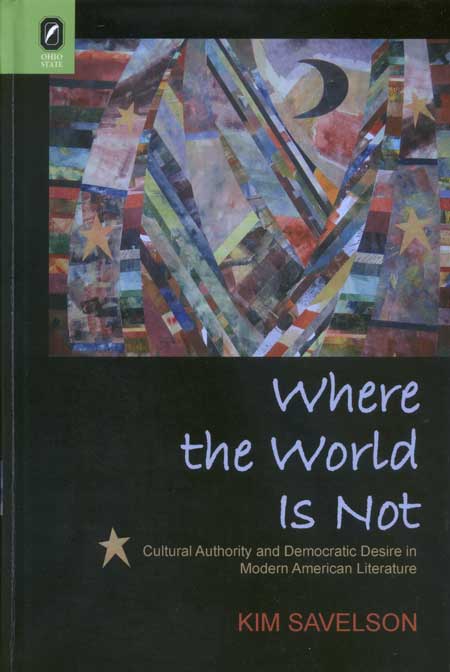Where the World Is NotCultural Authority and Democratic Desire in Modern American LiteratureKim Savelson |
 May 2009 Literary Criticism/American 196 pp. 6x9  $67.95 cloth 978-0-8142-0746-8 Add cloth to shopping cart $29.95 paper 978-0-8142-5751-7 Add paper to shopping cart $29.95 PDF eBook 978-0-8142-7912-0 Add PDF eBook to shopping cart Shopping Cart Instructions Review/Change Shopping Cart & Check-out | |||
|
read excerpts from
the book • |
“What makes Where the World Is Not so compelling and valuable is Kim Savelson’s consistently intelligent, thoughtful, and penetrating discussion of pragmatism in relation to fundamental questions about the social authority of education and culture in the modern United States.” —Thomas Augst, associate professor of English at New York University “The major contributions of Where the World Is Not lie in its identification of the trope of the inventor as a mediating figure in some well-known debates in intellectual history; its extended readings of canonical literary texts in exploring these debates; and its extension of its analysis to racial politics and the mid-twentieth century. It is an excellent piece of scholarship.” —John Swift, professor and chair of English and comparative studies, Occidental College How do novels that literally discuss invention and inventors engage through such discussions an array of critically important conversations and issues beyond invention? And to where and how can we trace and follow such discourses? In Where the World Is Not: Cultural Authority and Democratic Desire in Modern American Literature, Kim Savelson examines the ways in which resoundingly popular U.S. novels by Frank Norris, Willa Cather, F. Scott Fitzgerald, and Ralph Ellison host the tug-of-war between thought and action, between the democratic agenda of the pragmatist movement and the aristocratic idea of aesthetics. Savelson argues for and reads these novels as a way of thinking through the implications for the meaning and making of “culture” brought about by the ongoing social revolution of democratic modernity. She thus expands the scope of the current work being done on pragmatism, as well as the work being done on literature and democracy, carving out an intersection of these two fields. Savelson demonstrates that the questions under her consideration appeared at different key moments over the course of the first half of the twentieth century, embodying and deepening the struggle between the abstract and the practical, the cultural and the commercial—a struggle that turned into a dilemma and a period of growth for modern democratic desire. In so doing, she offers a historical recontextualization of selected literary texts, analyzing them as a way of thinking about intellectual history with subtlety and particularity.
| |||


